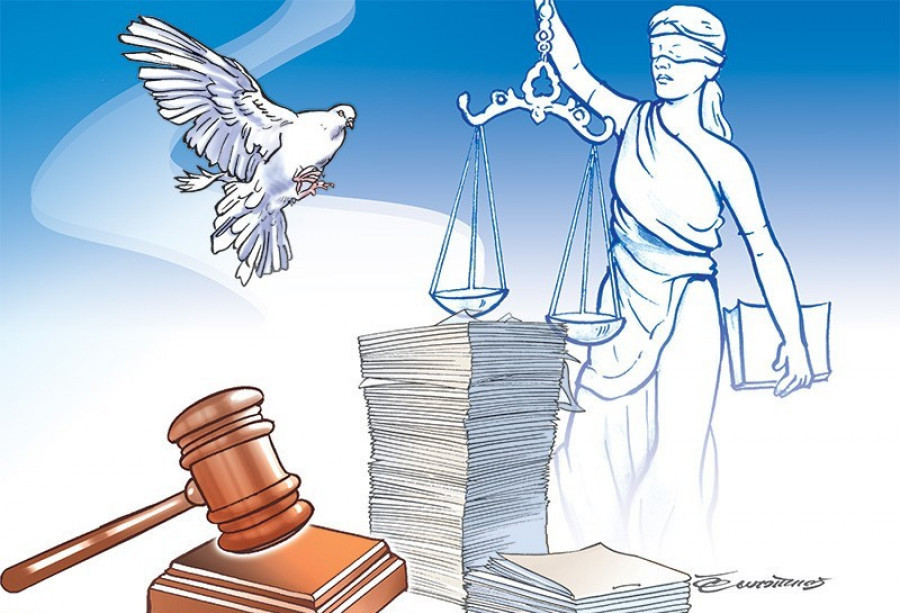Columns
Scars of the Maoist conflict
Resetting the truth commission now is a priority if citizens are to get closure.
Anttoni James Numminen
I moved to Nepal in 2009, and the scars of the civil war were still visible in everyday life. But through the eyes of a recently arrived young foreigner such as myself, it was perhaps only another aspect of a new environment. I now live in another country and more than a decade has passed, but it seems that little has been improved by the Truth and Reconciliation Commission (TRC) in which hope was placed for bringing truth and closure to the citizens of Nepal.
After several years of disagreement, and almost 10 years after the end of the Maoist conflict, the mandate for a TRC was finally approved in 2016. The TRC, alongside an investigation into forced disappearances, was tasked with investigating the serious human rights violations that were committed by both sides in the conflict. By July 2016, the commission had already received over 50,000 complaints from victims of the civil war. But five years on from that, the commission has failed to engineer reconciliation or bring about much-needed justice for citizens and victims.
Importantly, it is not too late to save this process of transitional justice and to properly address conflict-era atrocities that have affected so many, and continue to reverberate through the country. Restarting the TRC is an essential priority of the government (as soon as the Covid-19 pandemic eases) if the nation is to come to terms with the past, and if anything approaching justice is to be received. Restarting the transitional justice process (largely based on the Truth and Reconciliation Commission) is a matter of urgency. It is time that the perpetrators of human rights violations were held to account, and the cases of victims and survivors were heard and investigated. The notional process has gone on too long without results.
To move forward
'There can be no future without forgiveness,' said Desmond Tutu, chairman of the South African truth commission which helped usher the country away from apartheid. But before forgiveness can be considered, the truth, however unpleasant, must be known. This was realised by the South African truth commission which made every effort for its investigations and findings to be part of the public consciousness, something Nepal’s TRC should take note of. However, the truth alone is not enough and Nepal’s Supreme Court (taking a different stance to that in South Africa) has quite rightly ruled that the TRC should not give amnesties to the perpetrators of human rights violations uncovered as part of its investigations. Unfortunately, there have been hardly any successful prosecutions since the end of the conflict for severe violations, something Human Rights Watch has described as a 'continued failure of justice'.
Those who support amnesties as part of the transitional justice processes often argue that prosecutions are unfair because it is impossible to prosecute all those responsible, and those at the top of command chains escape culpability. A ban on amnesties means that at least some of those responsible for illegal acts will face the consequences, and some victims will finally receive justice. As things stand there have been no prosecutions which effectively means amnesties for all, regardless of the severity or level of involvement.
Realistically, even if the TRC were to restart with adequate funding, democratically chosen commissioners, enough resources and public trust, it is still unlikely to achieve all of its objectives. But it can initiate earnest investigations into the complaints lodged by the victims of the civil war, and it can begin proceedings against those responsible for perpetrating human rights violations. It should be said that the TRC is by no means a magic wand that will heal decades-old tensions and political frictions. But if structural and political changes (from healing huge economic and geographic inequality, to improving women’s rights and political accountability) were to happen, then making clear what occurred during the civil war, and why, must be prioritised.
The current political situation in Nepal—including recent machinations in Parliament—have further depleted many people’s trust in the institutions that are meant to serve citizens, but seem only to benefit those at the top. There is evidently a lack of faith in the TRC which, until now, has been organised by the same political elites. It is clearly now time for politicians and civil society to reaffirm their commitment to an open, fair and decisive TRC. One which, if successful, listens to the voices of all, including those in marginalised and rural communities, thus leading the way to a wider discussion about where the nation’s future lies.
The past need not define the present and the future, as Eric Patterson says in his book Ending Wars Well, but its truths should be known. In the same way that an understanding of events should guide the TRC’s activities, both in seeking the truth about the past and in acknowledging its own mistakes. Sometimes initiating a positive debate can be sufficient.
Forgive and forget?
Would it not be easier to forget the past and 'let bygones be bygones', as Desmond Tutu says? It would be an easier way, but not the right way. Ultimately, the call for forgetting is an argument in favour of the status quo. And the status quo is what led to this problematic situation. What is more, prosecuting human rights violators and upholding both national and international law would not only be the right thing to do for the victims and all those affected, it would also substantially raise Nepal’s standing as a responsible member of the international community.
However, this significant task should not be left only to the government of Nepal which will surely be dealing with the impact of the pandemic for years to come. It should also be the responsibility of the international community and non-governmental organisations to lend a hand. In particular, the British government, which has faced accusations of complicity in the Nepali Army’s human rights violations, should help to fund a restarted TRC.




 13.12°C Kathmandu
13.12°C Kathmandu















